Saul led the way across and stopped at Wolfe’s desk, and they lined up there, side by side, facing Dolly Brooke in the red leather chair, ten feet away. For thirty long seconds they stood, no movement, gazing at her. She gazed back. At one point her jaw moved and I thought she was going to speak, but she didn’t. Of course Saul was counting the seconds. I have timed him on it and he’s never off more than one to a minute. He looked at the other two, and they both nodded. He nodded back and they filed out, not to the front room but to the hall, closing the door behind them.
I slid the panel shut, no noise, and Wolfe and I went to the kitchen. When the door had swung shut he grunted and said, “Satisfactory.”
“Awful corny,” I said, “and awful tough. Why she didn’t scream or throw something or jump up and run I don’t know. I wish I understood women.”
“Pfui. Need you report?”
“No. I followed instructions and she reacted more or less as expected. What I need after that is a drink, and I have six or seven minutes.” I went to a cupboard for a bottle of Big Sandy and to a shelf for a glass, poured, and took a healthy sip. Fritz, who was at the sink sprinkling watercress, said, “There’s milk in the refrigerator.”
“Not when I’ve just watched three grown men bully a poor little woman.” I took a sip.
“She is not little and she may be a murderer.”
“Murderess. You mustn’t call a female Jew a Jewess, and you mustn’t call a female Negro a Negress, but it’s okay to call a female murderer a murderess.” I took a sip.
“Why?” he demanded.
“Because they resent it. That’s another civil right, resenting things. I resent being called a private eye or a hawkshaw, so don’t do it.” I looked at my watch, took a sip, put the glass on the big table, and told Wolfe, “Time’s up unless you want to stretch it.”
“I don’t.” He moved and I followed. Saul was in the hall, up front. He had let the other members of the cast out and was standing by, to stop her if she decided to duck. Wolfe sent him a nod, which he had coming, and opened the door to the office.
Dolly Brooke turned her head, jumped up, and demanded, “Who were those men?”
He circled around her to his desk, sat, and regarded her. “Will you please be seated, madam?”
“Tricks,” she said. “Tricks! Who were they?”
“When you stand I must crane. Will you sit?”
She sat down, on the edge of the chair. “Who were they?”
“I may name them later, or may not. Obviously they were identifying you as someone they had seen somewhere. It—”
“Where?”
“Let me finish a sentence. Mr. Goodwin has told you of the information furnished by Mr. Vaughn regarding his movements that Monday evening. As evidence of Mr. Whipple’s innocence that information was invaluable, but it had a flaw. Faced with it, you might say that the account you gave Mr. Vaughn was an invention; that you had not entered the building, even that you had not driven there. Therefore it was necessary to establish the fact that you had entered the building and approximately the times you entered and left. That has been done. The white man was Mr. Saul Panzer, who has no peer as an investigator. The Negroes were reputable citizens who live in Harlem. For the present I withhold their names; you may learn them later, in a courtroom, if the point becomes an issue.”
“Are you...” She let it hang. Her face had taken me along on her trip as she realized she had been flushed out of the tall grass. “You mean they saw me?”
Wolfe turned a palm up. “Could I make it any plainer, madam?”
He sure could. Me, I would have just said yes. I happen to prefer a straightforward lie to one with curves, but I admit it’s a question of personal taste. It isn’t that he wants to have an out; he simply likes them fancy.
She looked at me, saw only a manly truth-loving phiz, returned to Wolfe, and took a skip. “Peter Vaughn,” she said with feeling. “I owe this to him.” Another skip. “My husband.” Still another. “Do the police know?”
“Not yet.” Wolfe opened a drawer and took out a document. “I suppose they’ll have to eventually, but it’s barely possible that they won’t. Archie?”
I arose and took the document and handed it to her and stayed on my feet, since she would soon need a pen.
“Read it,” Wolfe said. “I made it as brief as possible.”
She was a slow reader. I thought she would never finish the first page, and she took even longer with the second. Finally she looked up. “If you think I’m going to sign this,” she said, “you’re crazy.”
“You won’t even consider it?”
“I will not.”
“Get Mr. Cramer, Archie.”
“Who is Mr. Cramer?”
“A police inspector.”
I was at my desk, starting to dial.
“Don’t do that!” she yelled. I could use a nicer word, but a yell is a yell. As I went on dialing, she bounced out of the chair, to me, and grabbed my arm and jerked. She turned to Wolfe and presumably was glaring; her back was to me.
“I won’t squabble,” Wolfe snapped. “You will sign that statement, now, or you will stay until Mr. Cramer comes.” He turned his head and roared. “Saul!”
The door opened and Saul was there. “This woman prevented Archie from making a telephone call,” Wolfe told him. “Don’t let her do it again.”
Three men and one poor little woman. Saul advanced. I lifted the receiver, which I had cradled. “Don’t,” she said. She touched my arm. “Please don’t. I’ll sign it.” The document was on the floor, where it had dropped when she bounced. Saul picked it up and handed it to her. She went to the chair and sat, and I took her a pen. The little stand beside the chair was mainly for signing checks, but it would do for signing statements too.
“All three copies,” Wolfe said, and I got the two carbons from a drawer and took them to her. As she did each one I took it and gave the signature a look. It slanted up, which I understand means something, I forget what. I went to my desk and put them in the locked drawer. Saul went over to a chair by the bookshelves.
Dolly Brooke said, begging, not telling, “My husband mustn’t know. The police mustn’t know.”
Wolfe eyed her. “It’s thorny,” he said. “With that statement I could get Mr. Whipple released from custody, but to clear him conclusively I must expose the murderer. The statement would be more to the point if it said that when you knocked at the door Miss Brooke admitted you, and you killed her.”
She goggled. “Are you crazy?”
“No. Did you? Kill her?”
“No!”
“I hope not. If you did, as long as I reserve that statement I’ll be withholding vital evidence; and I prefer to reserve it, tentatively. You say the police mustn’t know. On the contrary, they probably must, sooner or later; but I would like to postpone it until I can name the murderer, and it’s possible that by then your movements that evening will be of no consequence. I have—”
“You won’t tell them?”
“Not immediately. I have a question that is of consequence. I want you to concentrate on it all your powers of observation and memory. If you didn’t kill her, the person who did left the apartment and building within minutes, perhaps seconds, of the time you arrived. Possibly as you arrived. He may have been in the third-floor hall, leaving, as you mounted the stairs, and retreated to the floor above, remained there until you departed, and left the building soon after you. Or, bolder or stupider, he may have passed you on the stairs, descending as you mounted. Search your memory. Whom did you see, either while you were in the building, or leaving it after you did, as you stood and watched the entrance?”
Читать дальше
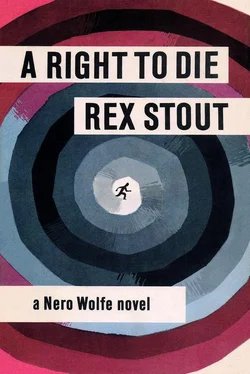
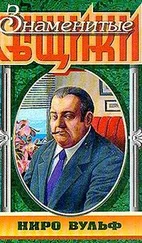
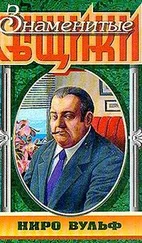

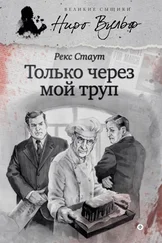

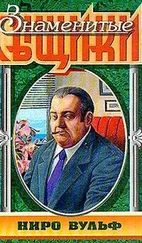
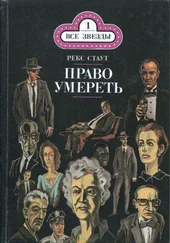
![Рекс Стаут - Лига перепуганных мужчин [litres]](/books/394342/reks-staut-liga-perepugannyh-muzhchin-litres-thumb.webp)